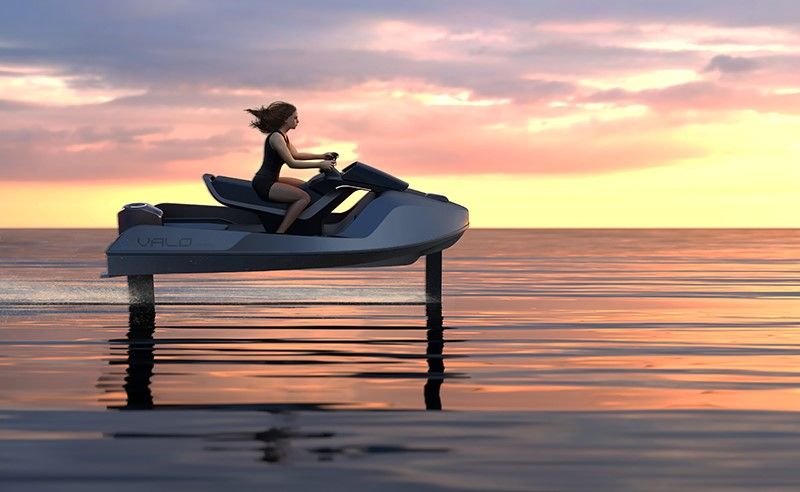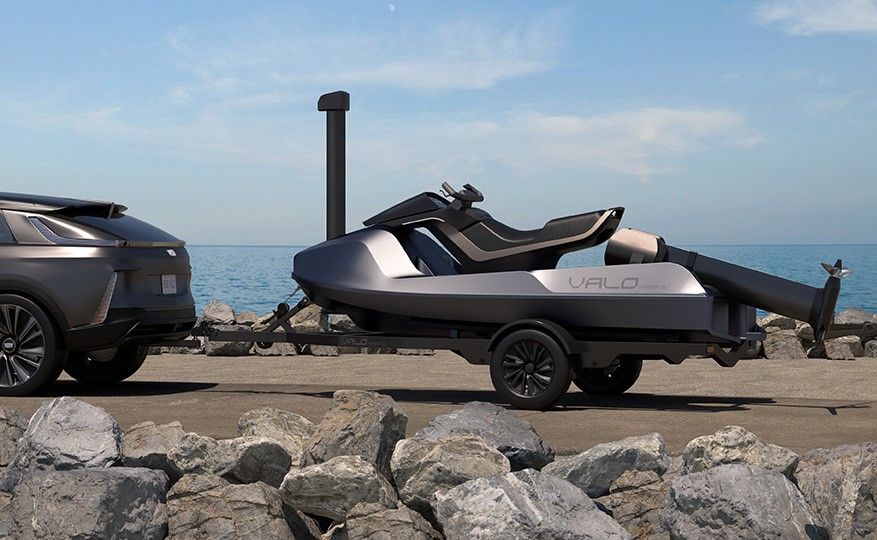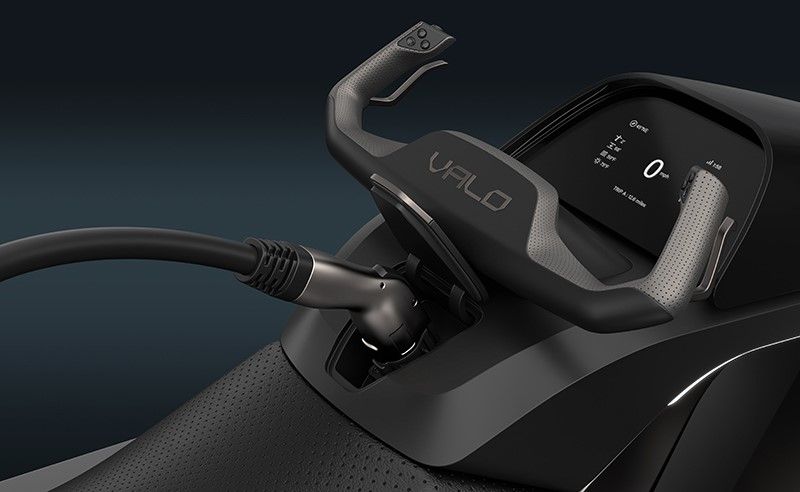Why is foiling the future, and how can it give you the ride of your life? How one visionary company started with those questions and let their ideas take flight.

Tech start-up Valo has revealed more details of its revolutionary new personal watercraft, the Valo Hyperfoil. This unique new product has already seen immense demand from consumers, with the limited production run of Founder’s Edition vehicles to be built in 2024 already being oversubscribed by 300%. The general production run is scheduled for 2025 with pre-orders currently open.
The Valo Hyperfoil is a two-person, high-performance, all-electric thrill ride that marks the evolution of the jet ski. Having moved from concept to first prototype in a matter of months, the rapid pace of development matches the scintillating performance and handling that it offers riders. The craft features a twin-foil setup with a 45kW drive motor and proprietary Skyride flight stabilization system.

Inspired engineering
It’s a dream that Ed Kearney – the company’s founder and CEO – has held since childhood when his father showed him a video of an early foiler. “I was about 12 or 13 years old, and my dad – who was an inventor kind of guy – showed me this video of some MIT students who had built a pedal-powered hydrofoil boat that broke the world record for a human-powered boat because it was so efficient,” Kearney says. “I remember asking myself, why aren’t all boats like this? Here is a technology that can completely revolutionize how we transport things on the water by making them ten times more efficient and incredibly comfortable at the same time”.
Born and raised in Australia and studying engineering before moving to California seven years ago, Kearney noticed that there was not much in the way of commercial hydrofoil development. “So I said why don’t we just do this? I wanted to create something no one else was making, because it was captivating and the world needed it.”
Taking flight
It is these cues from other industries, and drawing on the expertise of people like pioneering foiling naval architect Paul Bieker who serves as a consulting designer on Valo’s designs, that have led to the rapid development of the Valo Hyperfoil. The team – which was joined in early 2023 by CTO Reo Baird, a tech entrepreneur and boat fanatic who had previously been developing foiling boats with the company Navier – moved from concept to prototype in just six months, showing not only the pace and flexibility of an agile start-up but also proving that the concept was built on rock-solid design and engineering principles.
Since then, the team has tweaked the design to further enhance the experience for riders, moving to a twin-foil canard system for the foils aligned fore and aft on the centreline, and with the aft strut also housing the shaft-driven propulsion unit. The new design has resulted in 33% less strut drag than the alpha prototype while conferring improved stability and agility, and an increased maximum bank angle. Anhedral (swept-down) wings now deliver 30% more roll authority and contribute to the improved max bank angle.

Technological two-step
At the core of the Valo Hyperfoil’s performance is the clever foil package and shaft-driven propulsion system, which can propel the craft at a max speed of 35 knots while offering over two hours of endurance, good for more than 60 miles on a single charge. When combined with the proprietary Skyride active stabilization software, the Valo Hyperfoil represents a double step forward in marine mobility.
Skyride is developed fully in-house and has the role of keeping the vehicle stable as it slices through the water and waves. Hydrofoil vehicles are inherently unstable and hard to control since their center of gravity is very high above the point of support, just like walking on long stilts or riding a unicycle – balancing something very top-heavy is hard. Added to that, the vehicle has to operate very close to the surface of the water without going too high or too low.
Skyride solves this by combining data from various sensors around the Valo Hyperfoil and using aerospace derived algorithms to deliver hundreds of micro-adjustments per second to the various mechanical actuators that control the craft to keep it stable and agile.
“The Valo Hyperfoil is fully computer stabilized, and when you turn it enters into what’s called a coordinated banked turn,” CTO Reo Baird explains. “Think of it exactly like when a plane banks and turns, you don’t feel you are being pushed out of the turn and your coffee doesn’t spill because the forces run straight up and down through your vertical axis. This is how the Valo Hyperfoil turns using the Skyride software, and it’s truly exhilarating – and it allows for tight, highly precise turns. Making it feel good is not that straightforward – it’s something we’ve worked on a lot and it’s something we’ve solved!”
The software also allows for various modes – normal and sport, for example – while including full safety features. “The sport mode is designed to deliver much more exhilaration with sharper and harder handling,” says Baird, “but there are also lots of safety elements at the limit to make sure you can’t roll the Valo Hyperfoil over or crash. The software does have a more controlled hand in how the Valo Hyperfoil behaves,” he adds, “but we also want to make sure the driver feels like he is controlling the vehicle. It’s not like using cruise control on a car – it’s heavily weighted to the inputs on steering and throttle from the rider but while maintaining full stability to keep it safe. It’s a very delicate balance and it’s one I think we’ve struck perfectly.”
Practical magic
Central to the ethos of the Valo Hyperfoil is not only to make it as thrilling and as enjoyable as possible, but also to focus on reliability, robustness and practicality. What this means in practice is that construction will draw on high-quality parts, from carbon fiber, titanium and stainless steel for the body construction to selecting known suppliers for the components – the battery system and electric motor, for example, are being sourced from experienced manufacturers in the US and UK respectively.
Further, the team has considered how the Valo Hyperfoil is likely to be used when designing key elements. Not only is the Valo Hyperfoil trailerable on a standard rig, it can also be beached just like a conventional jet ski thanks to a lifting front canard – the foil slots into a recess in the hull – and a rear strut that tils similar to an outboard, allowing for shallow water propulsion. “It may not seem as simple as having a vertical lifting rear element,” says Kearney, “but the truth is those vertical lifting struts with drive elements can be a nightmare for jamming down or up. Our solution is both highly reliable and highly practical, which means riders can focus fully on the fun without fear of something going wrong.”
What’s more, the nod to sustainable boating with zero emissions, noise and wake means Valo Hyoerfoil riders will be able to explore places that other personal watercraft can’t access – and be able to do so without disturbing other people in the same area. This, perhaps, is as much the leap forward in personal water mobility as the design and hyperformance of the Valo Hyperfoil itself.
Future present
As Valo Hyperfoil moves toward production, with delivery of the first Founder’s Edition models scheduled for 2024, the company is celebrating the pre-launch success of their creation – they have taken more than US$3.3 million in advance orders already. They are also well into the development of a new product range for boat builders so they can easily enter the electric foiling era.
“It very much feels like the dawn of a new age for the marine industry,” says CTO Reo Baird. “It’s clearly the right time and place for the marine industry to make this move forward toward a new type of marine mobility.”
“It’s clean, with zero emissions, zero noise and zero wake; it’s fun, because you can enjoy exhilarating hyperformance in a wide range of sea conditions; it’s safe and comfortable because the Skyride software takes care of everything; and it’s practical, because you can do everything and go anywhere a conventional jet ski can go, and more besides,” Baird concludes. “It’s the future, and it’s right here, right now. We’re very excited to be moving into the production phase, and from the number of orders we’ve already received I think there are a lot of excited people out there too.”
As Kearney himself will tell you, “The Future is Foiling.”
About Valo
Valo is a marine technology start-up backed by the accelerator Y Combinator, Fifty Years, as well as Chris Sacca’s Lower Carbon Capital and former Meta CTO Mike Schroepfer. Their mission is to build the future of clean water transportation by using hydrofoil technology.
For more information: https://www.ridevalo.com/
PRESS OFFICE / SAND PEOPLE COMMUNICATION
sandpeoplecommunication.com
Melissa Nasuelli
valo@sandpeoplecommunication.com
m. +39 345 4480252
















